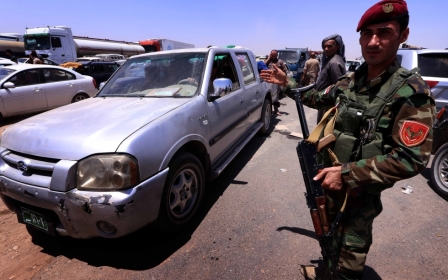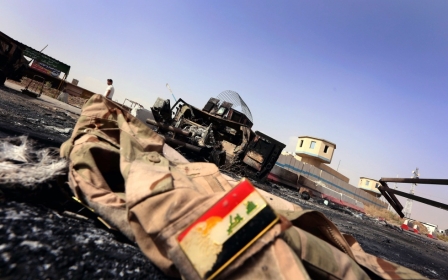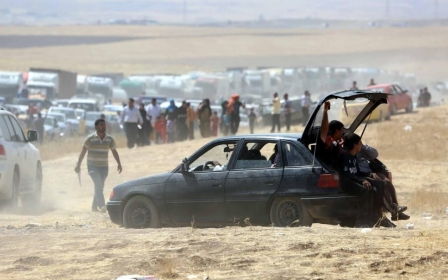Iraq’s soldiers of misfortune vow to return
ERBIL – The crowd surged towards the doors, towards an air-conditioned space and a way back to Baghdad. The office of Iraqi Airways in Erbil is besieged daily by hundreds of Iraqis looking for the safest way back to the capital. Many are government soldiers, trying to get flights back to Baghdad after being driven out of Mosul, Iraq’s second largest city, by militants from the Islamic State of Iraq and the Levant (ISIL). But they are not on the run; they hope to go back and fight for the city they lost, say soldiers waiting outside.
“We are still energetic and hopeful and we are ready to go back. Now we are waiting to get the tickets so that we [can] go back and fight and defend Mosul,” says Corporal Ahmed, 35, from Misan. Iraqi forces melted away last week, as militants from the Islamic State of Iraq and the Levant (ISIL) made their way through Iraq’s second largest city.
A quick march towards the south, encompassing the power station at Bajji, and provincial capitals of Tikrit and Samarra followed. The Iraqi army has started to push back and ISIL seems to have halted its offensive southwards for now. Its latest conquest, completed on Sunday, is the largely Turkmen village of Tal Afar, close to Mosul. It was one of the last places where Iraqi forces sustained a presence.
Religious duty
Soldiers on their way to Baghdad say they are keen to re-establish their presence in the north. The soldiers cited concerns about their family and town, but also the religious obligation created by the Shiite cleric Ali Sistani.
“Before it was an order from the military. Now it is an order for jihad from Sistani, one of the Shia’s biggest leaders, and he asked all the Shiites and all the people to go and fight … now it has a sense of religious, and not only military duty,” said Ghassan, a soldier from Samarra who has been fighting in the Iraqi army for 11 years.
He was referring to a call to arms issued by ayatollah Ali Sistani on Friday, in which his representative encouraged Iraqis to “bear arms and fight terrorists”. The statement encouraged Iraqis to join the Iraqi Army or a Shiite militia. Shiites rushed to volunteer in its wake, leading to concerns that it might lead to an increase in sectarian violence. The ayatollah has since revised his stance, releasing a statement aimed at “clarifying the position on taking up arms”. The revised statement encouraged Iraqis “to exert the highest level of self-restraint during this tumultuous period”.
But creating religious fervour is not without its risks, says Aron Lund, who has written on ISIL for the Carnegie Endowment. “The more the government side makes this a Shia mission to recapture Mosul and strike back, the more they resemble their foe,” argues Lund. “The more that kind of rhetoric comes to the surface, the more the religious hostilities will increase.”
But there is logic behind it, says Lund. The Shiite community is a last pillar of support for Iraq’s prime minister, Nouri al-Maliki, and he needs them to rally it to his cause. Lund sees parallels between how its neighbour Syria dealt with the rise of the Islamic group. “It’s like in Syria, how Assad began to rely on certain communities,” says Lund. However, like in Syria, it might prove a double-edged sword. “It helped him deal with the problem but it also helped to split the country,” says Lund.
Soldiers and civilians don’t see eye to eye
But it’s not just Shia who are eager to retake Mosul.
“We want to go back and enter the city,” shouted a group of young soldiers, who had been forced to surrender and are now stuck in one of the refugee camps on the outskirts of the last checkpoint before Kurdistan. Without a Kurdish host to vouch for them, they can’t enter the Kurdish Region, despite it officially being part of Iraq.
Shaalan, a man wearing a black poloshirt with white flowers, is a member of an elitist US-trained SWAT team and was defending one of Mosul’s major hotels until four days ago. Now he sits sweating idly in a UNHCR-provided tent, and says he would do anything to go back. “We are waiting for orders,” he explains. “We are waiting for the call. I went to register my name at 6am this morning,” he says. I want to go back to Mosul to defend it,” he says. His motives are personal. “If we don’t go back, they will kill my family,” he says, simply. Security forces, and especially elite US-trained units such as his, are targeted.
Graphic images of security forces killed by ISIL emerged over the weekend, with the Iraqi military confirming the death of 170 of its forces after capture by ISIL. The Islamists claim to have executed as many as 1700 Shiites.
Mosul residents, meanwhile, are fearful for a return of the Iraqi army. “Now the situation is very good, but Maliki will come with his force and everything will be destroyed,” said one man who was on his way to Erbil, and didn’t wish to be named. “Maliki will bring airstrikes and the army to shoot at us, there’s no safety there,” he said, stating that this sentiment was shared by most in Mosul. While trying to dislodge ISIL from the city of Fallujah, captured six months ago, the Iraqi army has turned to increasingly desperate measures, including the use of barrel bombs on civilian areas.
Cowards or betrayed?
The soldier’s valiant rhetoric comes on the heels of a speech given by the Iraqi prime minister on Saturday, in which he called the mass desertions a good opportunity to weed out “weaklings and cowards”, and threatened the death sentence in response to the desertions. "Those who did nothing, and those who clearly abandoned their posts, let them not imagine that they escaped to [safety] in the houses of their families and mothers,” he said. The prime minister was speaking from the town of Samarra, 80 miles north of Baghdad, where the Iraqi army is currently battling ISIL militants.
Yet the soldiers had a hard time recognising themselves in the words of their leader, stating that they had been abandoned by their commanders. “We were betrayed,” says Corporal Ahmed, who has been in the army for eight years. Soldiers from group 2 and 3 said their commanders were unreachable by telephone and that they were simply left to their own devices. Without a command structure in place, they decided to leave the city, shedding their military uniforms for civilian clothing and leaving their weapons on their base.
The commanders’ motive for the betrayal? Money, say the soldiers, and potential future gain. “ISIL promised them higher positions once they fully control Iraq, or a huge amount of money,” says Ghasssan, who served in the Iraqi army for 11 years before slipping out of Mosul last week. He still can’t believe what his superiors did, just disappearing, and then being ordered to surrender to Kurdish Peshmerga forces.
The Iraqi army is pushing back further south and has managed to stymie ISIL’s advance to the capital. The military announced the killing of 279 “terrorists” during a televised news conference on Sunday. Despite soldiers’ vows to defend Mosul, whether the Iraqi military will be able to retake the city remains far from certain. For now, Iraq’s second city, and its citizens, remain in ISIL hands.
New MEE newsletter: Jerusalem Dispatch
Sign up to get the latest insights and analysis on Israel-Palestine, alongside Turkey Unpacked and other MEE newsletters
Middle East Eye delivers independent and unrivalled coverage and analysis of the Middle East, North Africa and beyond. To learn more about republishing this content and the associated fees, please fill out this form. More about MEE can be found here.




